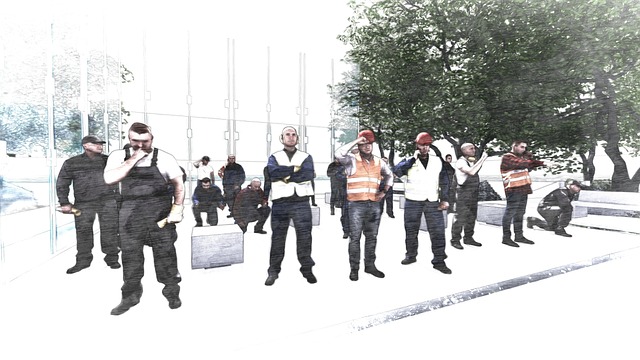Background checks are a comprehensive process that involves various types – including criminal, education, employment, credit, and social media verifications – to uncover critical information about individuals. These checks play a vital role in ensuring safety and security across sectors like employment, housing, and education by verifying academic credentials, employment history, financial reliability, and online behavior. In today's digital era, organizations leverage diverse background check types to make informed decisions, mitigate risks, and cultivate trustworthy environments that align with their values.
In today’s world, understanding the role of criminal background checks is paramount for both individuals seeking opportunities and organizations ensuring safety. This article explores the various types of background checks, with a focus on criminal checks, their significance in maintaining security, and their impact across different sectors. From education verification to employment screening and beyond, we delve into credit checks and social media background checks, highlighting their unique roles in vetting candidates.
- Types of Background Checks: An Overview
- Criminal Checks: What They Entail and Their Importance
- Education Verification Checks: Ensuring Academic Integrity
- Employment Background Checks: A Vital Tool for Businesses
- Beyond the Surface: Credit Checks and Social Media Background Checks
Types of Background Checks: An Overview

Background checks are a multifaceted process, designed to uncover various aspects of an individual’s history. These checks play a critical role in ensuring safety and security across diverse sectors, from employment to housing and education. They involve several types, each serving specific purposes:
1. Criminal Checks: These are perhaps the most common, aimed at identifying any criminal record or outstanding warrants. They help organisations gauge potential risks associated with hiring or admitting individuals into certain environments.
2. Education Verification Checks: This type ensures that academic credentials claimed by applicants are genuine. It’s vital for institutions to verify degrees, certifications, and other educational qualifications to maintain the integrity of their programmes.
3. Employment Background Checks: Often conducted during job applications, these checks scrutinise employment history, work performance, and references to assess suitability for a role. They help employers make informed decisions about hiring.
4. Credit Checks: While primarily used in financial sectors, credit checks evaluate an individual’s financial reliability by examining their credit history and score. This is crucial for determining loan eligibility or rental applications.
5. Social Media Background Checks: With the digital age upon us, these checks analyse social media profiles to uncover potential red flags that might not be evident from traditional methods. They offer a glimpse into an individual’s online behaviour and interactions.
Criminal Checks: What They Entail and Their Importance

Criminal background checks are a crucial process that involves examining an individual’s history to ensure their suitability for specific roles or opportunities. These comprehensive evaluations delve into various aspects of an applicant’s past, encompassing different types of background checks like education verification, employment history scrutiny, credit checks, and even social media investigations. The significance lies in the ability to mitigate risks associated with hiring or admitting individuals who might pose potential threats.
The process is designed to uncover any criminal activities, outstanding warrants, or financial irregularities that could impact the safety and integrity of an organization or community. For instance, employment background checks help employers gauge candidates’ trustworthiness by verifying their work history and identifying any red flags related to previous employments. Similarly, social media background checks have become increasingly important, as they allow organizations to assess an individual’s online presence for inappropriate content or behavior that might reflect poorly on the company’s image.
Education Verification Checks: Ensuring Academic Integrity

Education Verification Checks play a pivotal role in maintaining academic integrity, especially when it comes to ensuring that credentials and degrees are legitimate. These specific types of background checks delve into an individual’s educational history by verifying enrollment, graduation, and academic performance records. This process is crucial for institutions, employers, and even licensing bodies to make informed decisions. By cross-referencing information with official databases, these checks help uncover potential fraud or discrepancies, safeguarding against the admission of ineligible students or hiring practices that might compromise safety or quality standards.
Beyond traditional employment background checks, credit checks, and criminal records reviews, education verification checks are a vital component in the comprehensive background check landscape. They contribute to a multi-faceted approach by examining various aspects of an individual’s history, including their social media profiles (if relevant), to paint a holistic picture. This is particularly important in today’s digital age where academic credentials can be easily forged or manipulated online. Therefore, education verification checks are not just about checking facts; they are a defense mechanism against deception and a step towards building trustworthy systems.
Employment Background Checks: A Vital Tool for Businesses

Employment background checks are a vital tool for businesses to ensure they hire trustworthy and reliable candidates. These checks go beyond traditional resume screening, providing comprehensive insights into an applicant’s history. They include criminal checks, education verification checks, and even credit checks, aiming to identify potential risks or red flags. By leveraging these types of background checks, companies can make informed hiring decisions, safeguarding their operations and reputation.
In the digital age, social media background checks have also gained prominence. Businesses often use these checks to cross-reference information from resumes and references, verifying claims made by applicants. This multi-faceted approach ensures that businesses hire individuals who align with their values and culture, fostering a safer and more productive work environment.
Beyond the Surface: Credit Checks and Social Media Background Checks

In today’s digital era, understanding the various types of background checks is more crucial than ever. While criminal checks and employment background checks are common, there are less obvious yet powerful tools like credit checks and social media background checks that play a significant role in vetting individuals.
Education verification checks, for instance, provide insights into an individual’s academic history, adding depth to their qualifications. Social media background checks, though often overlooked, can uncover information that may not be readily available on traditional records, such as patterns of behavior, associations, and online interactions relevant to the role or position being filled. This holistic approach to background checks ensures that organizations make informed decisions, mitigating risks and fostering a safer, more trustworthy environment.
